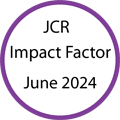Stress Factors Associated With Burnout Among Attending Physicians: A Cross-Sectional Study
Abstract
Background: Burnout in attending physicians is a crucial issue that may negatively impact patient outcomes, as well as affect the quality of training provided to residents. To investigate the association between burnout and stress-coping ability, we conducted a cross-sectional study of attending physicians.
Methods: From April 2013 to March 2014, we distributed an anonymous, self-administered questionnaire to 1,897 attending physicians who attended teaching-related training sessions and workshops. The questionnaire included the Maslach Burnout Inventory General Survey (MBI-GS, Japanese version) to evaluate burnout; the sense of coherence scale (SOC, Japanese version) to measure stress-coping ability, with higher scores indicating higher stress-coping ability; the Brief Scales for Job Stress (BSJS) to assess stress and buffering factors; demographic factors; mean weekly working hours; and factors related to instructing residents. The MBI-GS was used to determine the presence of physician burnout. Subjects were divided into tertiles based on SOC scores. We conducted logistic regression analysis of burnout using the following independent variables: physician experience, sex, mean weekly working hours, SOC group, mental workload, and reward from work.
Results: Of the 1,543 (81.3%) attending physicians who responded, 376 did not meet the inclusion criteria and 106 had missing data, thus 1,061 (55.9%) were analyzed. The prevalence of burnout was 17.2%. Physicians with burnout had significantly fewer years of experience as a doctor (P < 0.01), were more likely to be female (P < 0.01), worked more hours per week (P < 0.01), and had a lower SOC score (P < 0.01) than physicians without burnout. On the BSJS, the mean score of all stress factors was higher and that of buffering factors was lower in physicians with burnout (P < 0.01). The percentages of physicians with burnout were 35.7%, 12.8%, and 3.2% in the low, middle, and high SOC groups, respectively (P < 0.01). Using the high SOC group as a reference, the adjusted odds ratio for burnout in the low SOC group was 4.7 (95% confidence interval: 2.31 - 9.63) (P < 0.01).
Conclusions: In this study, burnout among attending physicians was significantly associated with SOC scores after adjustment for stress factors and buffering factors.
J Clin Med Res. 2018;10(3):226-232
doi: https://doi.org/10.14740/jocmr3299w











